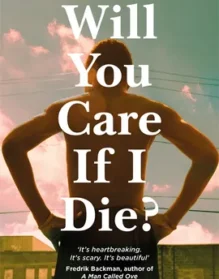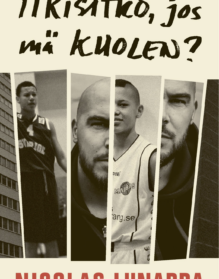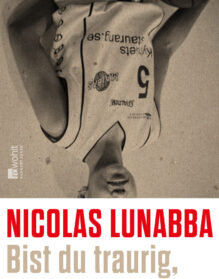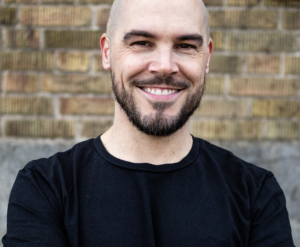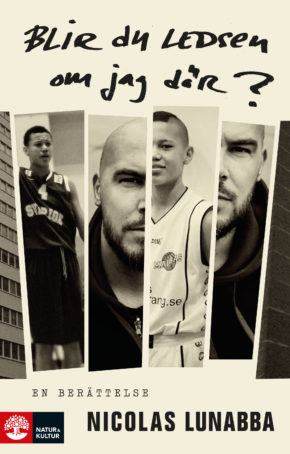
Part literary sensation, part political manifesto, Will You Care If I Die? is Ta-Nehisi Coates (Between the World and Me) meets Tara Westover (Educated) about young boys in no-go zones who are viewed only as future criminals, not as children with the world before them. A piercing memoir about friendship and love, and a shattering depiction of social class, this is a tour de force that makes us see beyond the laconic headlines of gang violence.
Nicolas Lunabba grew up saturated in violence and has devoted his adult life to working with teenagers in vulnerable areas. It’s easy for him to get the young boys to trust him; he used to be one of them. He never lets anyone come too close – a vital survival strategy in an area where children murder children. When Nicolas takes an unruly boy named Elijah under his wing, unwillingly letting him move in, he crosses his own line. Grief is the possible price you must pay for love, and Nicolas is wholly unprepared for the journey he and Elijah now set off on together.
With the odds stacked against them, can he keep Elijah out of harm’s way and help him realize his dream of becoming a professional basketball player? And what will happen to the other boys Nicolas can’t take in? Written as a letter to Elijah in a disarmingly direct and unapologetic prose, Nicolas Lunabba lays bare the uncomfortable consequences of segregation, confronting us all with our own unflattering complicity: will you care?
While his discourse stems from a Swedish reality, its implications are manifested in cities all over the world. In an increasingly polarized society with far-right parties on the rise, this humanization of young boys is a much-needed injection that draws readers in and forces them to question their own passivity and prejudice.
Ultimately, Will You Care If I Die? is a blazingly topical and universal story about what it means to see someone, and the difference it makes to be seen. With its twists and incredibly high stakes, this story about a young boy on a crooked path to a brighter future is also a breathless page-turner proving that truth can indeed be stranger than fiction.
Extra Materials
Reviews
“Will You Care If I Die? is as uncompromising as that question suggests. It’s an honourable book that aims full tilt for truth and confronts despair, cruelty, waste, rage and pain with a kind of contagious defiance.”
– The Guardian (UK)
“Everyone needs to read Nicolas Lunabba’s Will You Care If I Die?. Everyone. […] You become happily immersed by the fine-grained portrayal. But it is also a testimony written in despair. And a well-articulated accusation against Malmö, Sweden and the political situation. […] In [Nicolas Lunabba’s] book, everything finally becomes real. The social reality pours in. What a relief.”
– Sydsvenskan (SE)
“[Nicolas Lunabba] is a hero of course, but also a surprisingly driven author. He puts his narrator-self on the line, lets him oscillate between rage and profound doubt and brings forward, with almost an intrusive honesty, all the reservations, the reluctance and sometimes even the disgust that he feels for the gangly boy who suddenly resides in his previously peaceful bachelor pad. […] It is strong and thought-provoking, moving and sometimes even comical.”
– Dagens Nyheter (SE)
“Nicolas Lunabba’s Will You Care If I Die? has already become one of the autumn’s most notable books. No wonder, as it is one of the most important and finest things you can read at the moment. […] I did not put down Will You Care If I Die? one single time. I literally read it in one go. Its richness is that it is as much about marginalization as it is about friendship between different generations. About givning a damn. It even allows itself to be a little sentimental, but it doesn’t matter, because it feels so real.”
– Barometern (SE)
“It is an impressive read and one is left speechless that someone dares be this brazenly honest. The reason is that the author knows that only total honesty can break barriers and achieve miracles. Only when a boy dares believe in an adult does his self-esteem and belief in his own abilities grow. And miracles happen in plural. Elijah changes and breaks old patterns. […] One is struck by the insight of how difficult it is to save one single person in this context.”
– Fagerstaposten (SE)
“I feel bad for the authors who have books coming out at the same time as Nicolas Lunabba. Because from now on everything will be about Will You Care If I Die?.”
– Aftonbladet (SE)
“… Nicolas Lunabba is not what contemporary right-wing Swedes have come to label as goodness addict or goodness apostle. He describes his choice not so much as a selfless act to save a young person as a selfish attempt to save himself. Nicolas Lunabba isn’t even sure he wants this. With his human needs, Elijah disturbs him in his own life and habits and of course Nicolas is aware of how shady it looks: why would a grown man offer a teenager to move in with him? […] Nicolas Lunabba has a language that never tries to be sensationalist and his reflections flow between references from Dead Prez to Vilhelm Moberg and Kristian Lundberg. […] Nicolas Lunabba has so much to tell. He has to continue.”
– Expressen (SE)
“Nicolas Lunabba’s memoir about how troublesome Elijah moves in with him is well-written, moving and incredibly important.”
– Nordvästra Skånes Tidningar (SE)
“A candid portrayal of what it means to take care of someone else’s child, what it is like to really be seen by someone else, but perhaps above all a fiercely urgent testimonial of young people who live in the shadows.”
– Norrländska Socialdemokraten (SE)
“One of the most important books of this year. An unusually well-written, but above all touching, memoir. […] Here the words weigh heavy. So read- instead of listening to politicians fish for votes.”
– Norra Skånes Tidningar (SE)
“At times, Lunabba cultivates a burning political indignation, which stems from what he sees around him, working in Malmö’s poorest and most violent areas. His opinions are never left hanging in an abstract way, they are always related to concrete events or memories. He alternates his reflections, analyzes and expressions of emotion with depictions of scenes and snapshots, and thus creates – through uncomplicated, straightforward language – a varied and vivid whole. And some chapters are extremely moving. […] Despite the suffering, and despite all the understandable anger and indignation, this ultimately becomes an exceedingly beautiful story rooted in the classic Swedish working-class literature. And the key-words, both socially and humanly, are commitment and solidarity.”
– Hufvudstadsbladet (FI)
“This is a book that very few could have written as compelling, harsh, and tender as Nicolas Lunabba has done. […] It is a cliché, but it is and remains one of the most important things that literature can do: show us what lies beyond our own horizon of experience, beyond our categories of what is familiar, simple and safe. […] There isn’t anyone who shouldn’t read this book. Or: everyone should read it.”
– Agendamagasin (NO)
“In the very personal story of a friendship and of growing up, the author convincingly weaves in issues of class, the desolate state of almost abandoned schools, and the structural violence of a politics that are not based on basic human needs.”
– Morgenpost (DE)
“With an accessible style, [Lunabba] paints a shocking image of the violence and crime that is the everyday reality in neighborhoods Nyadala and Herrgården. […] Other than portraying a disarming and honest story, Lunabba also offers a fascinating analysis of immigrants’ place in Swedish society. […] This book is strongly recommended if you want a better understanding of how matters such as inclusion and exclusion work at the bottom of Swedish society. […] Who wants to save these young people, and what does it take to do it? Anyone who has a well-grounded or unfounded opinion on this should read this raw report, it is an eye-opener.”
– De Volkskrant (NL)
“This book will pull most readers out of their comfortable lives and show that the other world, the one which you sometimes read about in the newspapers, is really there. And it is harsh and unfair. And fortunately, there are people like Nicolas, who care about that other world.”
– Tzum (NL)
”It’s said that we all have a novel within us. But not even heroes like Nicolas Lunabba can necessarily distill a story and achieve a novel that works. But Lunabba excels. His Sommar i P1, about what happens when Lunabba lets a boy move into his home, in book-form becomes much more than ‘just’ a gripping story about the children who choose violence instead of future. There is a poetic rhythm to Lunabba’s language, he avoids clichés and lets the anger drown out the sentimentality. The result is an epic act of accusation, a merciless portrayal of Sweden’s betrayal and – above all – the beginning of an intriguing authorship.”
– Malin Persson Giolito, bestselling author of Quicksand and Deliver Me
“It’s an astonishing book, one that makes you oscillate between tears and laughter.”
– Leif GW Persson, bestselling author of The Dying Detective
”I’m a little late to the party, but this really is the best and most important book of the year.”
– Andreas Cervenka, bestselling author of Greedy Sweden
